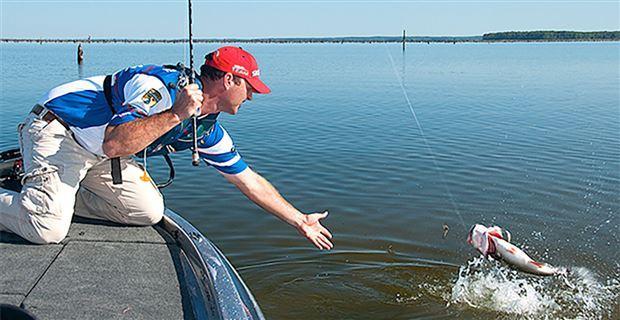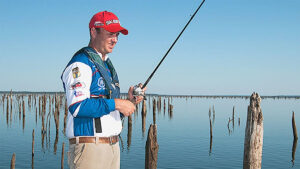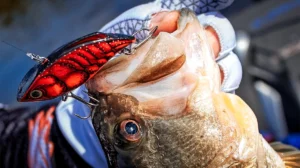Among his contemporaries in professional bass fishing, Todd Faircloth rates as one of the most consistent anglers in the sport, regularly finishing well and always a threat to win any tournament he enters. The Yamaha pro has a simple answer for his consistency: He doesn’t lose very many fish.
“It’s not an easy lesson to learn, and believe me, I’ve lost my share of fish that ended up costing me some high finishes and definitely a lot of money,” said Faircloth, a 6-time Bassmaster Elite winner who will be fishing his 14th Bassmaster Classic in March. “But I have also spent a lot of time studying why I lost those fish and have made some serious adjustments to my fishing style in order to keep fish losses at a minimum.”
The first adjustment Faircloth made was to change to softer-action rods when he fishes treble hook lures such as crankbaits and jerkbaits. He believes one of the main reasons anglers lose bass is because their rods are too stiff and hooks simply pull free. Instead of using a heavy-action rod, Faircloth has changed to more limber medium-action rods that flex evenly and with less pressure.
In winning a Bassmaster Elite tournament at Lake Amistad several years ago, for example, Faircloth used a medium-action, 7-foot, 6-inch flipping rod while fishing a heavy swimbait lure. Most want the heaviest action rod they can find with these types of lures, but Faircloth boated bass over 8 pounds with the more limber rod and won with a total of 76 pounds, 15 ounces. Just as importantly, he never lost a fish.
“On swimbaits, crankbaits and jerkbaits especially, you’re not really setting the hooks on the fish itself,” Faircloth said. “Instead, the bass is grabbing the lure and you’re just pulling the hooks into it. A stiffer, heavy-action rod simply does not flex to absorb the shock when you do this and the hooks never grab the fish.
“This doesn’t happen nearly as often with a single-hook lure like a jig or plastic worm because you’re just driving the one hook into the fish’s mouth, and a stiffer rod can do this.”
Treble hook lures often tend to be larger lures and bass use the weight of the lure as leverage to help them “throw” the lure free. That led to Faircloth’s second major fishing adjustment, which is to change all the treble hooks on his lures to short-shank models.
“The majority of factory-made lures today are fitted with long-shank treble hooks that swing more freely when a bass jumps and shakes its head,” Faircloth said. “Every time a fish does that, chances increase the lure will come loose. A short-shank hook actually keeps my lure pinned closer to the fish’s head so the bait can’t swing back and forth. I’ve changed to short-shank trebles on every treble hook lure I have.”
Faircloth’s third fishing adjustment was to change how he played bass as he was bringing them to the boat. He stopped depending on the drag systems in his baitcasting reels to control the fish and began relying entirely on spool pressure he applied himself.
“I don’t use the drag system on baitcasters at all,” Faircloth said. “Instead, I disengage the reel and thumb my spool. I feel like this gives me quicker and more complete control, especially on a larger bass.
“I can put pressure on the spool with my left thumb and keep my right hand on the reel handles to engage the reel instantly when I need to. If I feel the bass is pulling hard enough to possibly break my line, all I do is lessen my thumb pressure and let the fish gain a little line.
“These are just three changes I’ve made in my fishing over the years, and now I hardly think twice about them,” Faircloth concluded. “I still lose a bass occasionally, as does every fisherman, but certainly not as many as I did a few years ago.”













